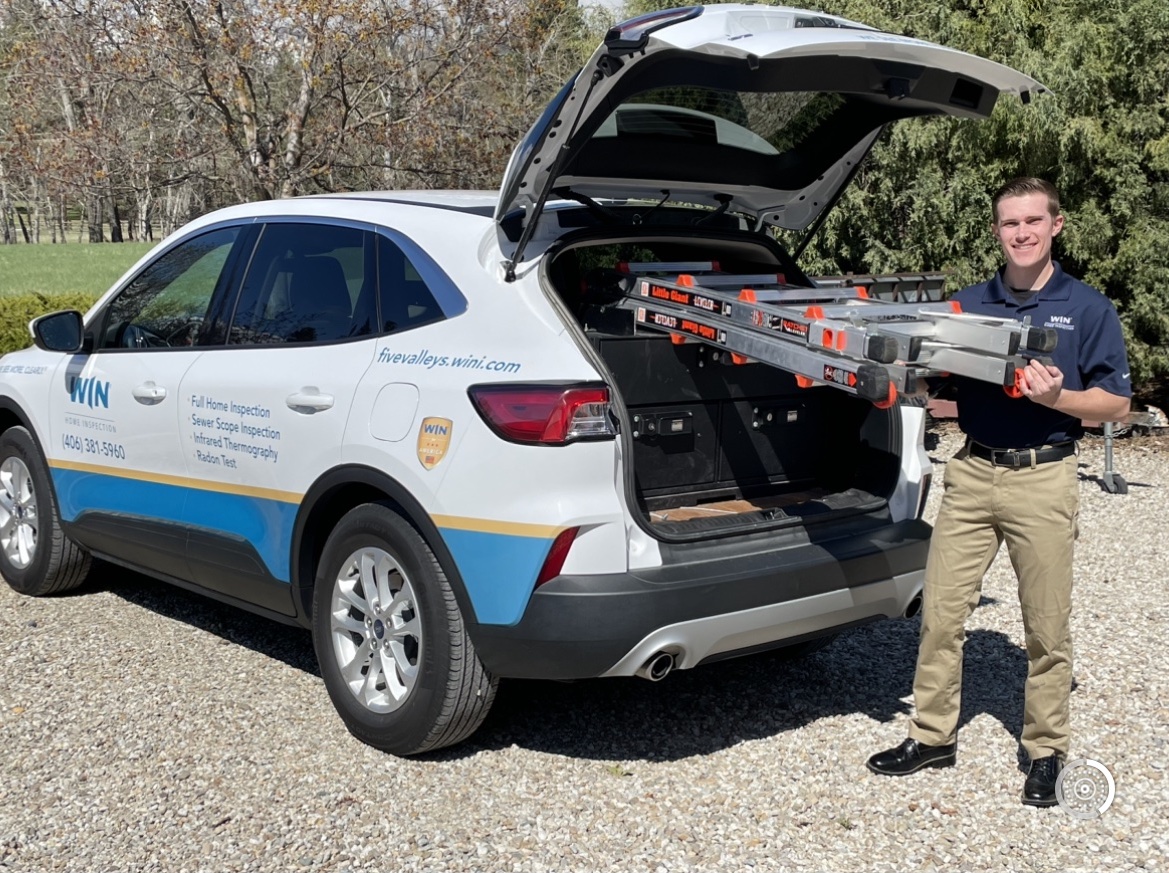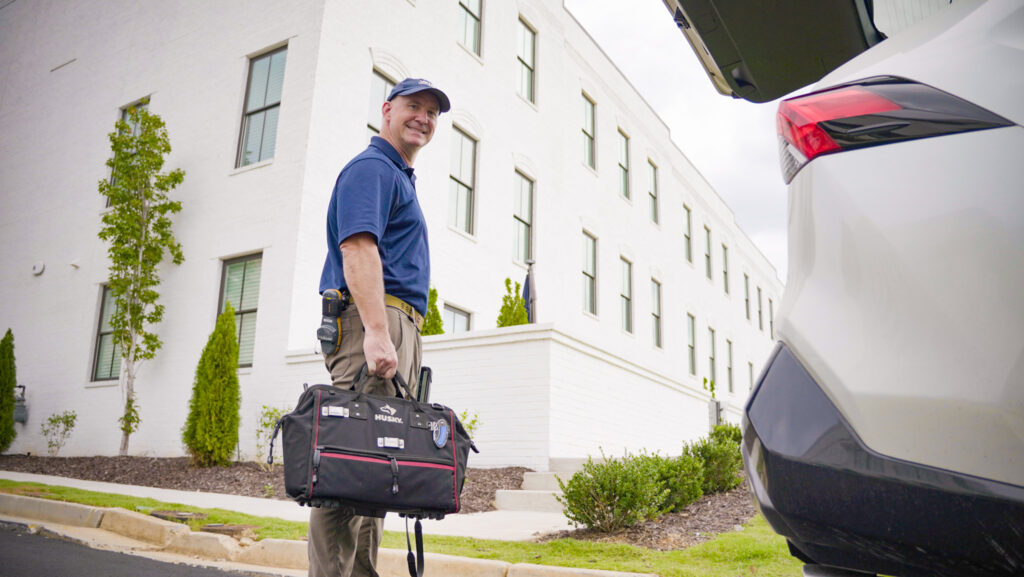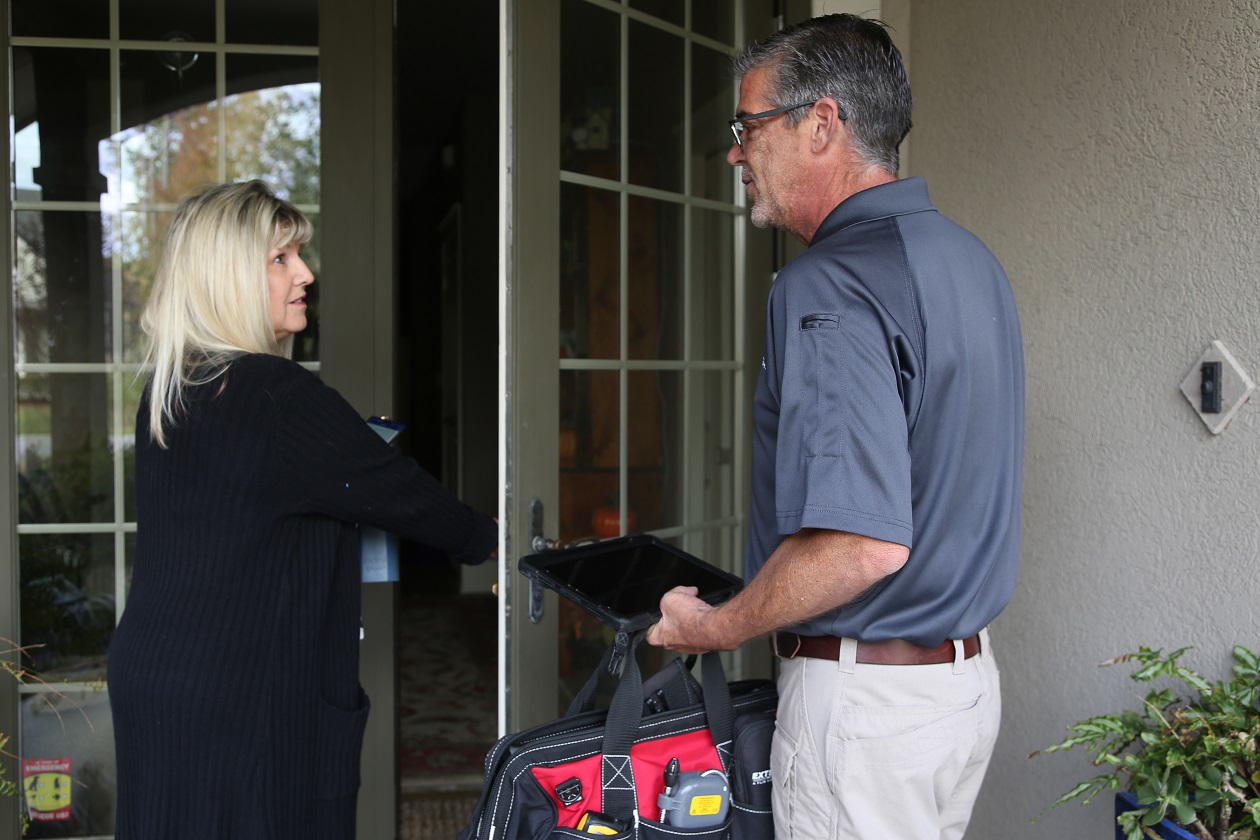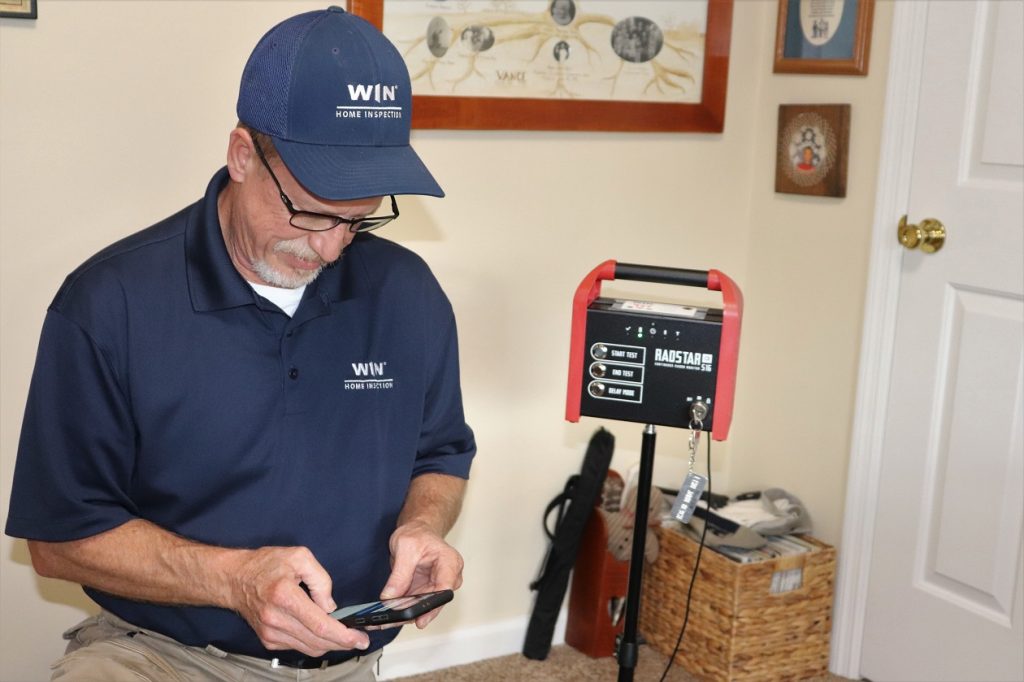Ready to Embark on an Exciting Journey with WIN?
Take the first step toward personal and financial freedom by filling out the interest form. One of our franchise advocates will be in touch with you soon!

For many people, entrepreneurship has been the most reliable way to achieve financial independence and career satisfaction. Starting a home inspection business is one option.
Why home inspection?
– Home inspectors are in demand: The U.S. real estate market was valued at $3.43 trillion in 2024 and is projected to grow at a compound annual growth rate of 2.80% between 2025 and 2034, reaching a value of $4.52 trillion by 2034, according to a report by EMR. About 95% of home sales involve a home inspection before closing.
– Get started quickly: Even if you don’t have a background in the building trades, you can complete your training to become a home inspector in a matter of months.
– It’s a transitional career: If you are a contractor or building trade professional and are thinking of a career switch, home inspection is a great way to put your knowledge and skills to use in your own business!
– Work from home: While you will need to travel to the homes that you inspect, much of your work can be done remotely.
A home inspection business provides essential health and safety inspections for home buyers and sellers during real estate transactions. Appraisers consider home inspection reports when evaluating a property’s value, and insurance companies may require home inspections before granting the buyer home insurance. As a home inspector, your top priority is to help your client make an informed decision about the property they are interested in purchasing.
Buying or selling a home is a significant investment of time, energy, emotions, and financial resources, and being a trusted partner for home buyers and sellers is one of the most rewarding aspects of owning a home inspection business. You also have a responsibility to identify potential home health hazards to keep your clients informed and aware of any possible repairs they need to make. This safeguards your community and helps minimize potential financial pitfalls down the road.
The steady climb in real estate values and new units means that getting involved as a home inspector now puts you ahead of the market’s growth. You can prepare your business for any potential housing spikes over the next few years.
Unlike real estate, home inspection extends beyond the ebbs and flows of the market. Some franchises, like WIN Home Inspection, offer services that help franchise owners create multiple income streams throughout the year. These annual or seasonal home maintenance checks give inspectors flexibility and recurring business even during the real estate downseason.

Every successful business venture begins with a plan, helping you make decisions about how and when to start your business. You can start your business as an independent or join a franchise.
Start by conducting a SWOT analysis, identifying the strengths, weaknesses, opportunities, and threats for your business. This will help you understand the market landscape and growth opportunities. Then, determine your target market, pricing strategy, financial projections, and operational plan.
Every aspect of the plan is essential for your business’s success. When deciding whether to start an independent business or join a franchise system, keep in mind that joining a franchise offers many benefits you can use to set yourself up for success from the beginning.
And stick with it! Your business name is your brand. Changing your brand after launch confuses clients and prospects, making it difficult to get an edge in your market.
Catering to all markets and demographics is impossible. With home inspection, your market consists of home buyers and sellers. At the beginning, it might be more beneficial to focus more on the buyer market to spread brand awareness.
Setting your price point is essential. Not only does it determine your income and cash flow, but also helps you focus on your target market. If you live in an affluent area or a booming new-construction neighborhood, starting with a higher price point might be a better way to maintain steady profit margins. Conduct a competitive analysis to see where your area’s market stands with pricing.
Lay out financial goals for your business before selling your services. Think about where you’d like to take this investment in 10-15 years, and don’t let smaller roadblocks stand in the way of that.
» Dig deeper on how to create a business plan for success
Home inspection is a great business opportunity for new entrepreneurs because no prior knowledge or experience is required to get started. You will, however, have to get training. This is true even if you have a background in the building trades. Home inspection is its own profession, so you’ll have to learn how to inspect homes and write up reports that meet industry standards.
Depending on where you plan to start your business, you may have a choice between classroom-based and online training programs. Training typically covers different aspects of home inspection, such as structural components, exterior and interior systems, electrical and plumbing systems, and HVAC systems. The amount of training you’ll need to get certified depends on the state where you’ll be conducting the inspections. It’s important to research the specific training requirements needed to start your home inspection business.
While most franchises will refer you to an outside training school, WIN Home Inspection includes an in-house training program at no additional cost, so you can get trained in a timely and cost-effective manner.
After training, you’ll need to get certified and licensed if your state requires it. National associations like the American Society of Home Inspectors (ASHI) and the International Association of Certified Home Inspectors (InterNACHI) offer certification programs. The licensing process varies by state, with some requiring passing a state examination or completing a specific number of inspections under supervision. Once completed, you’ll receive a state license number and can begin performing home inspections for clients.
In addition to licensing, you’ll need to secure all necessary permits and purchase business insurance before you start running your business. Depending on the laws in your area and the nature of your business, such as if you’re operating out of your home, you might need certain permits or licenses as well.
Moreover, insurance plays a critical role in protecting your business. Obtain a general liability insurance policy to protect your business from potential lawsuits or claims resulting from inspections. Additionally, consider errors and omissions (E&O) insurance to cover you if a client claims you missed something during an inspection.
» Also Read: Home Inspector Insurance Cost: What You Need to Know
Setting up a Limited Liability Company (LLC) or an S-Corp is an essential step when starting a home inspection business. An LLC protects your personal assets from being used to cover business-related debts or lawsuits. Each state has different rules for setting up an LLC, so research your state’s specific requirements or seek advice from an attorney or accountant. Even if you join a franchise, establishing an LLC or an S-Corp is still an important step in starting your home inspection business.
Here are some common terms you should familiarize yourself with:

There are many ways you can obtain a competitive edge in your market:
Separating your personal finances from your business finances is crucial. Opening a business bank account makes it easier to track business expenses and revenues. Additionally, it contributes to the professional image of your business and may help you obtain business loans or lines of credit. With the many upfront costs of starting an independent business, securing a business loan may be necessary.
If you need a loan, research different banks and credit unions to see which would give you the funding you need at the best possible interest rate. If you invest in a franchise, you may have special financing options available to you, and if you are an active-duty military, veteran, or first responder, you may also have access to exclusive discounts that could help you kickstart your business.

While there is no inventory required for starting a home inspection business, having the right tools and equipment is essential for providing high-quality services. Your home inspector toolkit should include items like a drone, moisture meter, electrical testers, gas leak detectors, thermal imaging devices, and more. You may also need equipment, including ladders, stepstools, toolboxes and belts, and safety equipment.
Marketing is the bread and butter of any business. Without it, you won’t be able to reach the clients you want and put your training and start-up costs to good use. Here are some ways to start marketing your business effectively:
Staying up to date with industry trends is crucial when starting a home inspection business. Real estate and construction, which directly impact home inspection, are continuously evolving. New building materials, methods, and regulations emerge, and inspectors must be knowledgeable about these changes to provide accurate and thorough services.
Regularly attending industry conferences, participating in professional forums, and subscribing to industry publications can keep you informed about the latest trends and best practices. This not only enhances your competency but also builds your credibility and reputation in the industry, leading to more business opportunities and higher client satisfaction.
Building a successful home inspection business doesn’t happen overnight; it’s a journey that requires persistence, resilience, and time. It can take months, sometimes years, to establish a solid client base and achieve consistent profitability. During this period, it’s important not to get disheartened by initial challenges or slower-than-expected growth.
Instead, see these as learning opportunities that will eventually lead to better business strategies. Remember, every successful business today was once a start-up navigating through uncertainties.
Every business experiences growing pains, but starting a business with a franchise can help alleviate many of those pains. In most cases, franchises offer a client base and established relationships that new franchise owners can take advantage of immediately. This gives them access to leads and opportunities that would normally take an independent business owner months or even years to build.
Moreover, they have a business model that is tried and true, meaning you won’t have to experiment with different strategies to see what works best. Finally, you’ll be part of an established brand, helping you gain recognition and trust within your local community.

Starting your own home inspection business may require an investment of money and resources. The amount needed will depend on what experience and resources you already have. Equipment costs may involve buying a tablet or computer, getting branded clothes, or purchasing ladders and safety gear.
The average startup cost ranges from $27k to $100k+, depending on whether you join a franchise or not and which franchise you choose. Know that in starting your own home inspection business, you need a decent amount of money out of the gate to cover items like E&O Insurance and training. Still, this is a significantly smaller investment than the cost of some franchises, which can reach into the millions for restaurants and fast food outlets.
Legal costs, marketing costs, and training and certification costs all occur continuously and will require a share of your profits to cover. Incorporate these expenses and all others not directly related to transactional spending into your annual business budget to ensure you aren’t met with any surprises.
Legal costs may include state exams, licensing fees, registering the business, and purchasing insurance. Operational costs to consider include payroll systems and third-party services. These services help you manage the day-to-day operations.
Finally, there are all the costs associated with marketing your business. Marketing costs are important for new businesses to gain visibility and attract customers in the community, leading to successful operations. Marketing costs, when first starting, typically include building a website, designing and printing business cards, and advertising.
To become a home inspector, you’ll need to undergo training and certifications. As an independent inspector, you’ll be responsible for these costs. In some cases, franchises will include the cost of training in their initial fees; however, you’ll be referred to a training school to complete your certification hours. Others don’t include the training costs as they don’t offer training to their franchisees.
Unlike most franchises, WIN Home Inspection has an in-house training team with decades of combined experience. The support team includes trainers, business coaches, marketers, and technologists who help entrepreneurs learn without any extra cost.
Keep in mind that these costs are estimates and may vary for each entrepreneur. The information is given to help you understand the potential costs of starting a home inspection business. In addition, these costs do not include living expenses. If you are the primary breadwinner, it is recommended to have funds saved to cover the cost-of-living expenses for at least six months until you are expected to turn a profit. Having these savings will help you focus on growing your business and achieving long-term success.
Franchising allows entrepreneurs to own a home inspection business with support. It gives them the freedom and flexibility of business ownership. Investing in a franchise involves purchasing a proven business model and utilizing a popular brand. This can lead to a rapid return on investment. In many cases, they can help you with everything you need to start and manage your business, like creating a business plan, building a strategy, and staffing your business.
Starting a home inspection business can be a rewarding venture if done correctly. From creating a thorough business plan to networking with real estate agents to marketing your business effectively, each step plays a crucial role in your business success. And if you choose the franchising route, know that you have robust support from industry veterans like WIN Home Inspection. The home inspection industry holds abundant opportunities for aspiring entrepreneurs.
So, what are you waiting for? Take the first step towards your entrepreneurial dream and contact the franchise advocates at WIN! They are available to answer your questions and help you determine if WIN is the right business opportunity for you. Please fill out our interest form and get in touch!